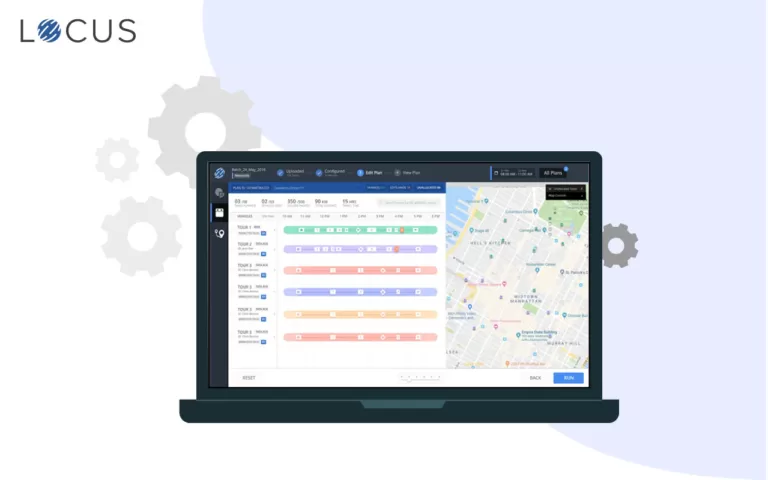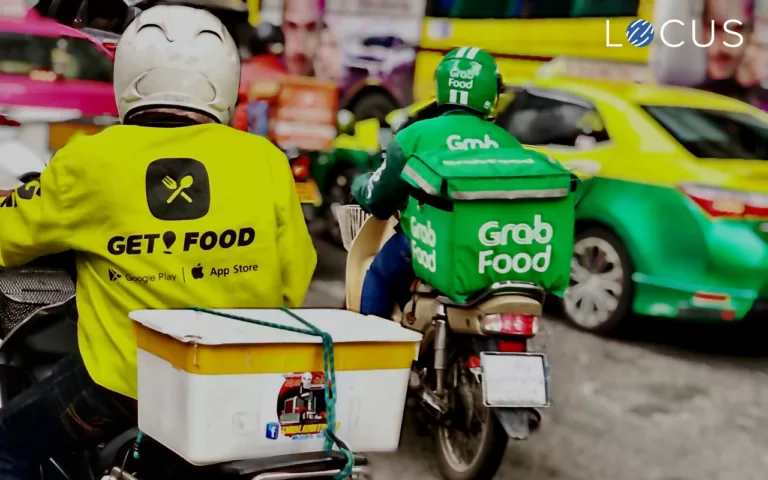Last Mile Delivery Optimization, Supply Chain Optimization
Using AI and Data Science to combat Covid-19
May 19, 2020
9 mins read

The Covid-19 pandemic makes Shantanu Bhattacharyya, Locus’ Chief Data Scientist, remember his days as a computational biologist working on the HIV vaccines at The Scripps Research Institute. He fondly remembers how he spent days and days in the lab researching, coming up with new ideas, looking at data to interpret patterns. “I was working on vaccine research. It feels strange to read about a similar type of work that I was doing. It is a very critical aspect now,” he says.
Shantanu carried his expertise of working on huge datasets to Locus and is now the brains behind the company’s cutting edge data science capabilities. Team Locus caught up with him to understand how data science is playing a crucial role in the present scenario and how it is going to be critical in changing the face of business and logistics going forward.
1. How are Artificial Intelligence (AI) and Machine Learning (ML) relevant in the Covid-19 times?
When Covid-19 began, the very first questions were data science questions. The first question was which is the risk group. It became clear that people in a certain age group are more vulnerable. Then it became apparent that people with certain predispositions were also at major risk. These became apparent very early. As we started collecting more data, we started identifying hotspots. It helped with policy. Data scientists do this day in and day out. You collect data and start figuring out patterns.
Next is businesses. There is both the human and economic element here. One of the areas where AI could help is—how is consumer behaviour changing? People drastically reduced ordering food and started cooking at home. Some businesses started booming, for example, hand sanitizers. Some businesses even ramped up their capabilities to match the demands.
Sticking to businesses there are now these considerations of affected areas. How am I going to supply goods there vs non-affected areas, what sort of items, do we ramp up the supply chain or collaborate more?
One of the other areas that has a lot of data driven research is— what is the comfort level of people ordering?Are they ordering from large brick and mortar shops or are they going niche and ordering from local shops? If people are buying from local shops, the big businesses need to then tie up with local shops more than they did in the past.
Prioritisation of scientific research is itself data driven now, as time is critical during a pandemic We need to get answers as fast as we can. We need to understand what is working and what is not. Redundancy of trying to do things that don’t work is extremely expensive right now. You need to know all sorts of interactions. Example, given a drug, people in this geography respond this way.
(The other is) Repurposing existing drugs. You need to try various combinations, some have shown different efficacy compared to others.
After all of this, there is the thing with- the basis of rational drug design. We have sequenced the virus, we know the composition. Based on that and all the patients who have had Covid-19 and responded to it, we study all the immune responses. Now we can think of applying AI/ML techniques to design interventions that elicit this response artificially. It will speed up the process of getting to the drug or vaccine.
The Final Frontier: Designing an optimal cold chain network to distribute the COVID-19 Vaccine
The summary here is- we need to make decisions super fast, which means we are looking for patterns. This is where AI and ML come in.
At various points in history, societies get forced into situations.
What happens if everyone works from home? In a normal situation, I have no idea how businesses would have decided to collectively let their employees work from home. People have been considering work from home forever, but we are collecting the data now. Does it work? Is it effective? Are people happy or not?
We are collectively living through a time that is not like anything else. We are collecting social interaction data. This data post Covid-19 will shape policies and decision making.
2. How can data help in logistics and how can Locus help?
Consumers are now placing a premium on hygiene. It is evident from how Swiggy, Dunzo, and other food and essential delivery apps are highlighting the hygiene aspect.
If you think about it, it all boils down to logistics. People want more transparency on how things are being procured and are arriving on their doorstep.
One of the impacts on logistics is the concept of zones— red, orange, green— and the norms associated with each of these. All key players in the logistics space, all decision making needs to take into account these zones. The very concept of making zones itself needs to be rational, it needs to provide maximum precaution, while minimizing economic impact. Zoning is going to be important. Locus can help here.
Another thing is, Many people have moved to E-grocery. They were forced into it but they know it is possible now. People are even buying medicines online, earlier they wouldn’t have.
This means there are new considerations coming in- routing needs to get faster, more efficient, and transparent. Locus Territory-Based Route Planning is a key player here. Companies can deal with a high scale (of orders) while automating decision making. Automation was always important, but the number of considerations that are in play now are so huge that even for the most seasoned person it is not possible to keep a track of everything. All decision making needs to be automated and must work at scale. The end consumer needs to be convinced that things are happening the way it should be and there is nothing to be worried about. All this needs a decision making platform and we have been providing this.
Check Out: The Definitive Guide to Logistics Route Optimization
You also need robust and flexible algorithms because business models are changing. If the use case or business model changes, your algorithm needs to change very fast. Handling a lot of use cases is something we have been doing even before Covid-19.
A painful truth everyone is realizing is that— disruption to supply chains is extremely expensive. It’s a matter of survival. Considerations for networks are very important.
Now packing efficiency has become important so as to take care of this surge in demand. These are areas that are becoming important, we offer some of these already. We are actively working on the others.
3. Things are changing so quickly, as a data scientist, how do you make the tech work for the ever-changing scenario?
To be able to appreciate the changing demands, we need to have a good pulse of how demand is changing for our customers. We are sensitive to that. How demand shifts, newer business models, new areas, we have a good hold on that and this gives us a head start. Our core algorithms were built in a flexible fashion. Our core is flexible enough to model all these different scenarios since we were already in the business of handling different use cases.
Our entire use cases have come from a diverse set of clients and diverse geographies, and hence we had the advantage of having seen it before. We were always looking to keep up with the increasing demand. The timeline shifted, we just pulled the trigger faster, Covid-19 has made the requirements clear.
4. Do you think logistics will change fundamentally?
One thing that is obvious—once the orders you deliver take a quantum jump, you can’t slowly scale, there’s no luxury for that. People will look at new business models like decentralization.
The concept of large warehouse delivering to far flung areas is harder. You want to be close to the client, it is anyway the fastest way to reach. You do not want to set up a lot of warehouses too as there is a cost to it. The way to deal with it is to tie up with local stores.
Imagine, if there is a high demand for a product in Kolkata, but it is not the same in Bengaluru, you do not want huge warehouses city wise, you can go to the locality level and say ‘Stock this up, the moment someone orders, you can deliver’. Thus decentralization will be important.
Another change could be automated deliveries. Now there is a sudden push for automated deliveries. There is more interest. In developed countries like US, you will see a thrust for self-driving vehicles, drone delivery, etc. The reason is there is already standardization. Streets are numbers, addresses are formatted… with more standardization, automation follows.
In developing countries, even if I have a drone and policies are in place, say you want to deliver to a local apartment, it needs to be geocoded correctly. It cannot be wrong. These will be roadblocks that companies like Locus can resolve. Once developed countries show how it can work, developing nations will catch up slightly slower, because standardization is missing.
Third, people should move away from constructs like localities and pin codes. You can’t use one size fits all. You should be able to define boundaries in an extremely use case specific manner. Once the concept of zones becomes obvious, it will get translated into a lot of other things. Platforms that provide the ability to create zones will stand out.

Related Tags:

3PL
Minimize your Last Mile Logistics Delivery Complexities using Logistics Automation
Last mile logistics deliveries are becoming more complicated with each passing day. On one-side, customer expectations are increasing, and on the other, delivery companies are struggling with rising distribution costs and pressures to maintain profitability. How automation eliminates delivery complexities in last mile logistics? Last-mile technologies like logistics automation have made it possible to run […]
Read more
Delivery Experience
Tackling Restaurant Supply Chain Challenges with Delivery Optimization Software
The online food delivery market is growing at an explosive pace in Southeast Asia. Rapidly increasing disposable income, a growing population of tech-savvy millennials, and a convenience-driven consumer lifestyle are the major factors influencing the rise of the restaurant delivery or online food delivery industry in the region. According to a report by Google, Southeast […]
Read moreMOST POPULAR
EDITOR’S PICKS
SUBSCRIBE TO OUR NEWSLETTER
Stay up to date with the latest marketing, sales, and service tips and news


Using AI and Data Science to combat Covid-19